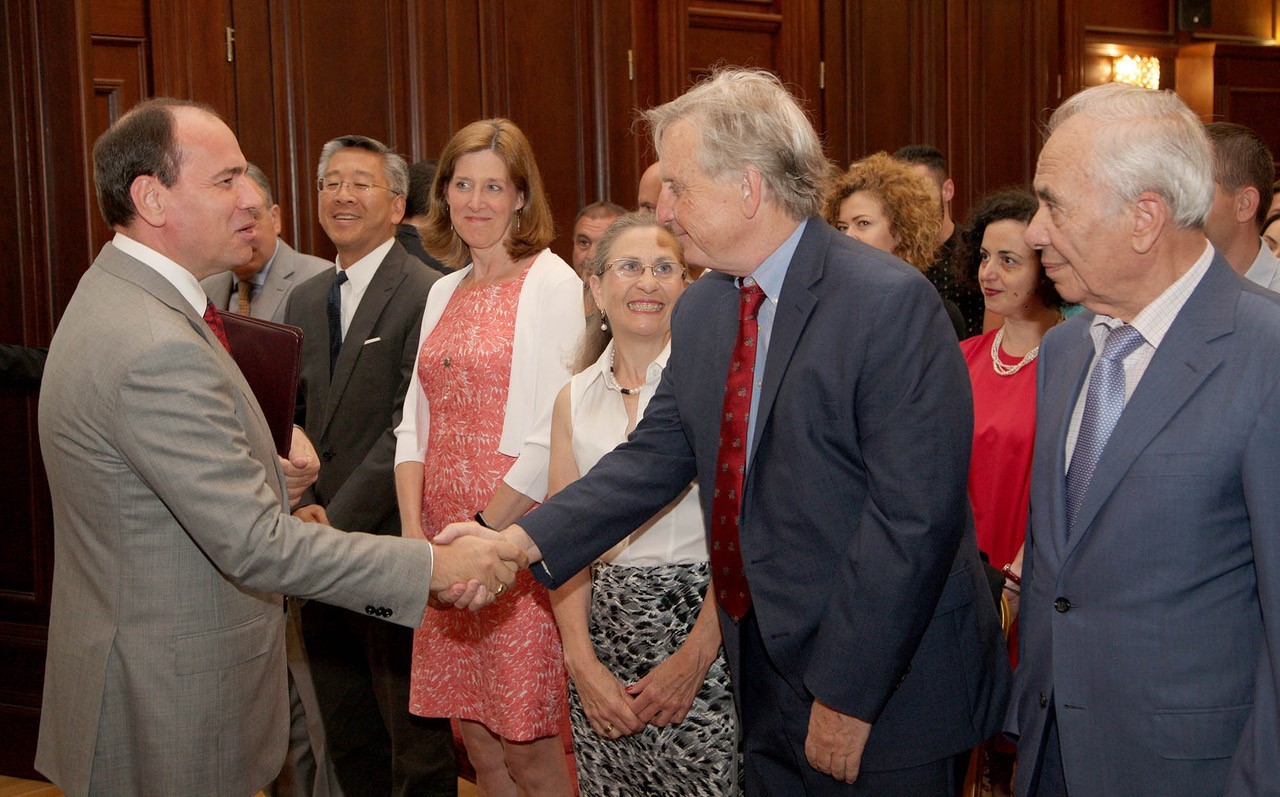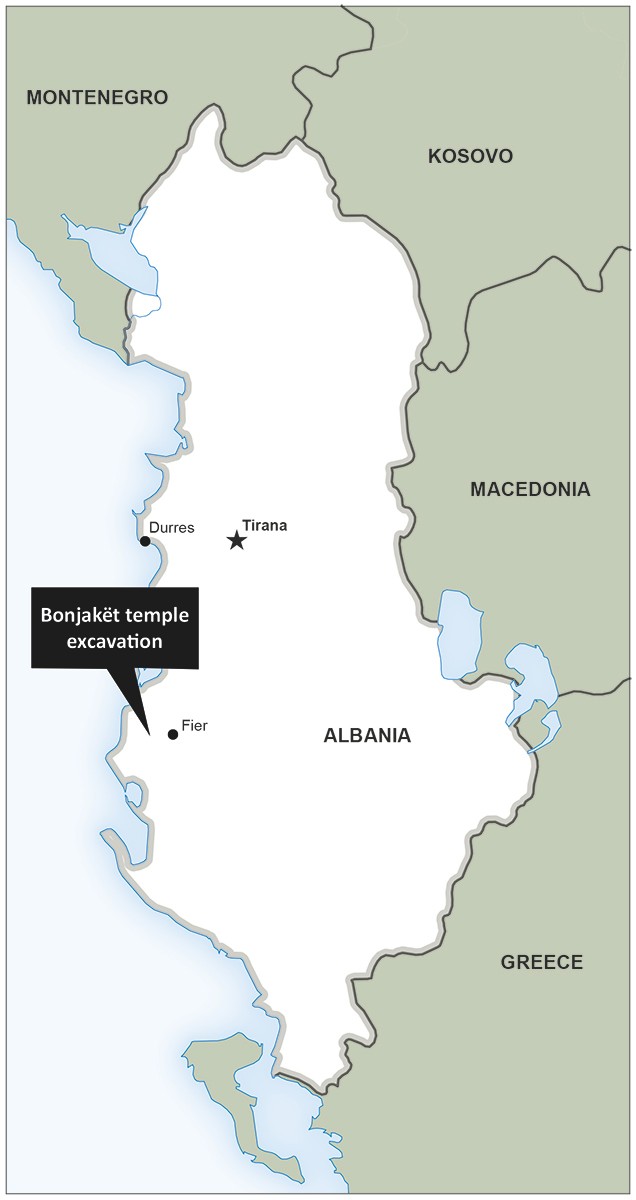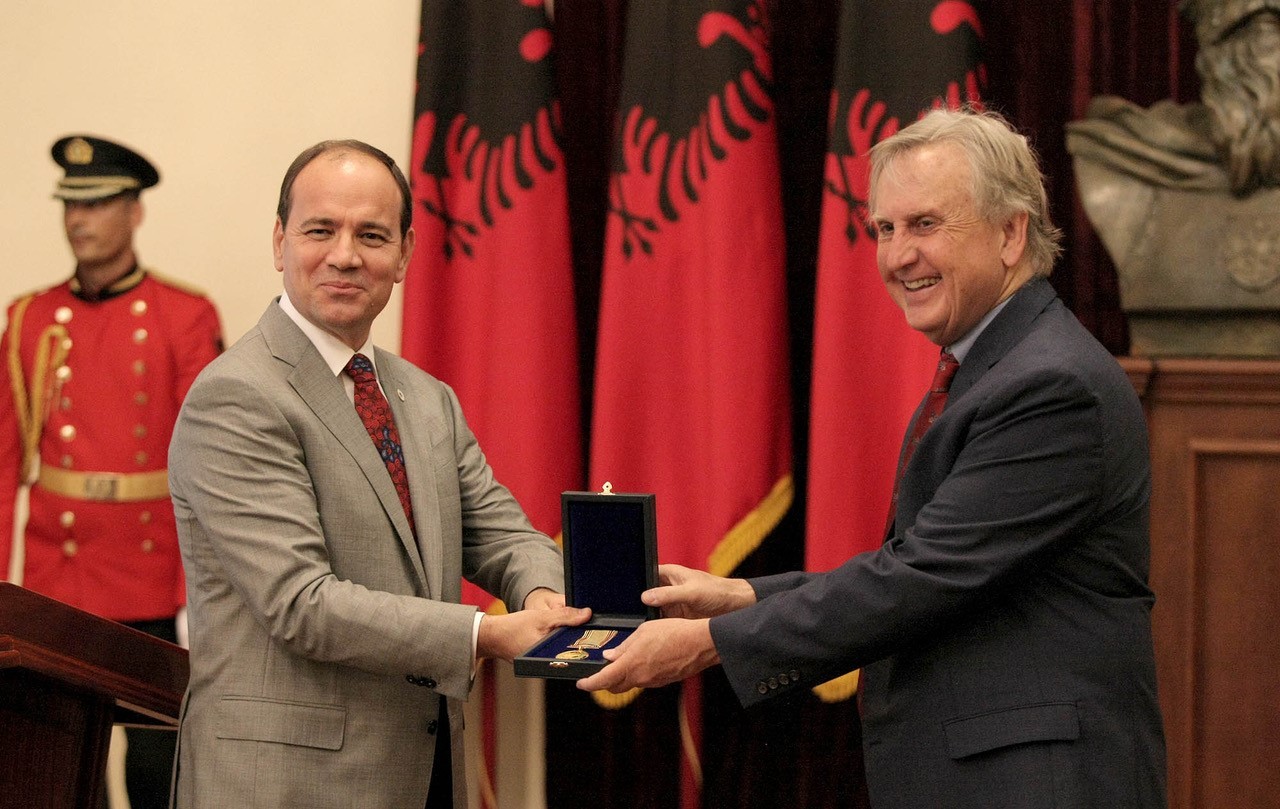University of Cincinnati archaeologist Jack Davis receives the title of Special Civil Merit from Albanian President Bujar Nishani at a ceremony held June 9 at the presidential palace in Tirana, Albania. Photo provided
UC archaeologist honored by Albanian government
UC archaeologist Jack Davis accepted Albania’s honorary title of Special Civil Merits on behalf of an international team that sought to preserve some of the country’s most significant historical sites at risk of being lost to development.
In 2001, just four years after Albania had plunged into anarchy and a near civil war, a team of University of Cincinnati archaeologists touched down in Durrës, a port city along the Adriatic Sea in the western part of the former communist enclave.
Co-directed by Jack Davis, UC’s Carl W. Blegen Professor of Greek Archaeology, the international team’s goal was to pinpoint and preserve important historical sites before they became lost to the wave of rapid development and commercialism transforming Albania after its emergence from almost a half century behind the Iron Curtain.
Within days, the archaeological rescue mission unearthed previously undiscovered ancient graves. A year later, the team struck archaeological gold with the discovery of artifacts in a site that would later be revealed as one of earliest Greek temples in the Adriatic Sea region.
Albanian President Bujar Nishani honored Davis on June 9 with the country’s honorary title of Special Civil Merits for his work in advancing and promoting cultural and historical discoveries important to Albanian history and heritage.
Nishani also praised Davis’s work in training Albanian students in cultural heritage management both in Albania and at UC in the ceremony held at the presidential palace in the Albanian capital city of Tirana.

Albanian President Bujar Nishani congratulates UC’s Jack Davis at a ceremony held June 9 in Tirana, Albania. Pictured, from left is Nishani, Ambassador Donald Lu, Ariel Ahart, Sharon Stocker, Davis and Muzafer Korkuti, president of the Academy of Sciences. Photo provided
Davis accepted the award on behalf of the entire team, including his wife Shari Stocker, previously a UC doctoral student who co-led the field survey work who now serves as a senior research associate in UC's Department of Classics.
Other team members include Albanian researchers Muzafer Korkuti, Vangjel Dimo, Iris Pojani, Afrim Hoti and Lorenc Bejko, and UC colleagues Kathleen Lynch, John Wallrodt, Tammie Gerke and Susan Allen. A number of UC graduate students, including Albanian international students Ols Lafe and Maria Grazia Amore, also contributed.
“Needless to say both Shari and I were thrilled that our efforts are appreciated by a country and people that are very dear to our hearts,” said Davis. “Any award is deserved as much by her as me. I am accepting it first on her behalf, but also on behalf of the dozens of others who participated in fieldwork.”
The UC team first arrived in Albania in 1994, just three years after the fall of communism in what was considered Europe’s most Stalinist country. Two years later, archaeological research began at the ancient Greek city-state of Apollonia, including a far-reaching survey of cultural resources in the hinterland of the ancient city.
That work led to the discovery of a large temple the team dubbed the Bonjakët temple, named for the family compound in which it’s located, located just outside Apollonia near the city of Fier in modern-day Albania.
The temple, the third of its kind to be discovered at Apollonia and only the fifth in all of Albania, is of “extraordinary and singular” importance to Albanian archaeology and the history of Greek colonization in the Adriatic Sea region for what it reveals about life in the 6th and 5th centuries B.C., a part of the early history of Apollonia of which little is known, said Davis.
Unearthing rare finds is nothing new for Davis and Stocker. The husband-and-wife team made international headlines with the 2015 discovery of the tomb of a Bronze Age warrior left untouched for more than 3,500 years and packed with a spectacular array of precious jewelry, weapons and riches.
They revealed findings from the so-called “Griffin Warrior” at a series of talks last year, including new understandings of the artifacts — particularly the discovery of four golden rings — and the insights they provide to the origins of Greek civilization.
Davis and Stocker plan to present further findings from the Bonjakët temple excavation next year.

About Classics at the University of Cincinnati College of Arts and Sciences
For 75 years, the Department of Classics of the University of Cincinnati College of Arts and Sciences has organized and supported archaeological research projects in the Mediterranean. This commitment to sustained archaeological research is paralleled by few other academic institutions in the United States. A consistent program of excavations and surveys has built the department's well-deserved reputation as one of the world’s preeminent centers of graduate education in pre-Classical and Classical archaeology.

